Definition of Python Fast
Python fast is considered in multiple ways, but generally, a Python programming language is not fast in execution compared to another programming language like C. This programming language provides the optimized performance to compile the techniques and extensions. Python contains a large library that makes the fast development of applications and allows iteration and prototyping. As we know, python is a high-level language and easy to use.
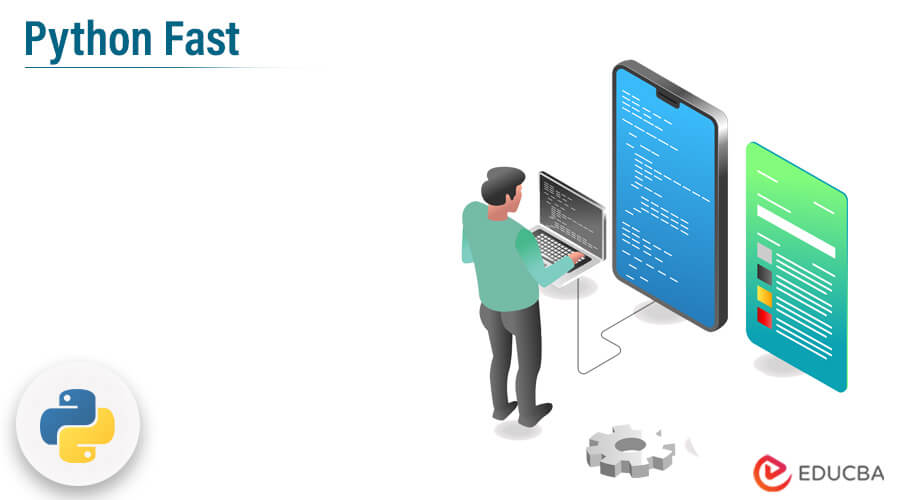
Key Takeaways
- Python fast contains multiple interpretations as per the context. The execution speed Python has interpreted language, which means we can say that Python runs slower than other compiled languages.
- In terms of development speed, python is faster than other languages, and the syntax of Python is clear.
What is Python Fast?
Python is an interpreted language with dynamic typing that allows for incredibly quick prototyping speeds, but it cannot match the run timings of C and many other compiled languages. When comparing Python’s 48.03 seconds to 0.94 seconds in C++ or 1.54 seconds in C, the fastest individual run times for several well-known programming languages.
To write pure Python code and handle the resources of contemporary hardware and GPUs, Fast Python is our manual to streamline every step of your Python-based data analysis workflow. We will discover how to multithread code, redesign wasteful data structures, and streamline datasets without compromising accuracy.
Quick, precise systems are essential for processing massive datasets and intricate analytical methods common in data science. Fast Python demonstrates how Python developers may increase performance by creating pure-Python applications that run faster, making the most use of libraries, and exploiting cutting-edge multi-processor hardware.
Direct calls can be made from Python code. These C libraries may be either general-purpose C modules or Python-specific libraries. Cython creates the second module type, consisting of C libraries that may be packed with current Python programs and communicate with Python’s source code.
How to Learn Python Fast in 2023?
Right now, there is a huge demand for a Python developer. If we consider a career as a Python developer fast, this is the ideal time to begin studying Python. Python has a sizable, growing user base and is a well-liked, simple programming language.
Below are the steps as follows.
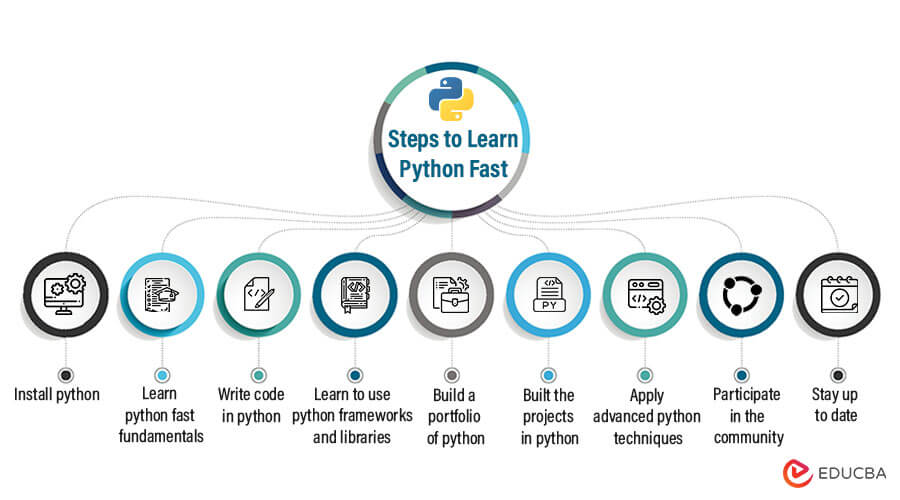
- Install Python – We need to install Python in our system. We can download the latest version from the python.org website and install it in our system.
- Learn Python fast fundamentals – The first step is learning the basic syntax, variables, and data types. Understanding the basic concept of any language provides us with a foundation for the next learning.
- Write code in Python – Write the small code to give the idea of how we can write and execute the simple code. At the time we write simple code, we can face multiple challenges.
- Learn to use Python frameworks and libraries – Python contains multiple frameworks and libraries like pandas, numpy, etc. There are different use for different types of libraries.
- Build a portfolio of Python – To build a portfolio of Python is very important because it is a critical quality for Python developers. We can build the portfolio of any project.
- Built the projects in Python – In this step, we can apply our skills to the project, such as building simple game applications and web applications, and also, we can automate the task of jobs.
- Apply advanced Python techniques – In this step, we can apply advanced techniques of Python to create a project.
- Participate in the community – We can join the online communities of Python. Also, we can attend meet-ups. We can also participate in the code challenges, connect with other Python developers, and learn from them.
- Stay Updated– We need to keep ourselves updated with the latest version of Python and relevant technologies by attending classes and reading articles.
Python Code Runs Faster Than Usual
Python is utilized in both web development and machine learning. Its widespread use in ML and Big Data, as well as its outstanding libraries and simple syntax, are just a few factors contributing to its success. Python has a disadvantage, however, and that is its poor pace.
Below are the Python tricks to run the Python code faster as follows:
1. Use proper algorithms and data structures
Each data structure greatly influences runtime. List and dictionary are just a few of Python’s built-in data structures. A list data structure is typically used in multiple situations. Since hash tables are used in Python to perform lookup operations in O(1) time.
The following situations allow us to substitute sets and dictionaries for lists.
- The collection does not contain duplicate pieces.
- The collection thoroughly searched for things.
- A significant number of artifacts make up the collection.
2. Use built-in libraries and functions
The best method to make our code run faster is to use built-in Python functions. Every time a built-in function is required. These built-in functions, like all, map, and others, are quick because they are written in the C language.
The below example shows how we can use the built-in function as follows:
Code:
def mf(n):
return len(n)
f = map (mf, ('ABC', 'PQR', 'XYZ'))
print (f)
print (list(f))Output:
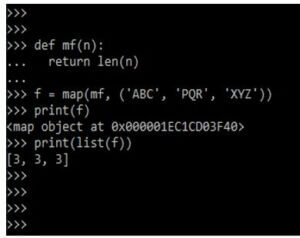
The below example shows the built-in function. In the below example, we have used the max function as follows.
Code:
def mf(n):
return len(n)
f = max(12, 16)
print (f)Output:
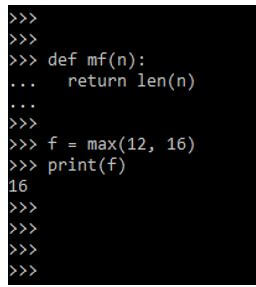
3. Use multiple assignments
If we want to assign multiple values, the best way is to assign them in a single line. The below example shows how we can assign multiple values in a single line as follows:
Code:
FName, lName, Addr = "ABC", "PQR", "MH"Output:
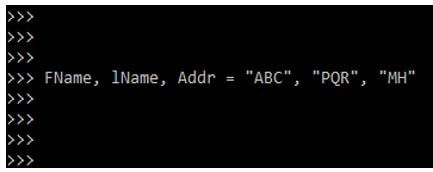
4. Use list over loops
A list can be created using the components of an old list with just one line of code using list comprehension, an elegant and superior method. The fact that list comprehension adds elements to a Python list more quickly.
The below example shows the user list as follows:
Code:
ls = [i**2 for i in range(1, 70) if i%2==0]
print(ls)Output:

5. Proper import
Import the necessary modules and libraries that are important in our code. We can specify the name of the module instead of importing all libraries.
The below example shows the import of the module as follows:
Code:
from math import sqrt
val = sqrt(5)
print(val)Output:

6. Concatenation of string
W can concatenate strings using the + operator. But we can concatenate the same in the join method. The below example shows how we can concatenate the string using the join method as follows:
Code:
op = " ".join(["ABC", "PQR", "XYZ"])
print (op)Output:
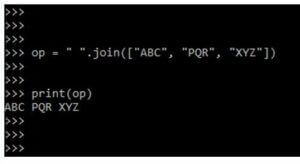
Examples of Python Fast
Given below are the examples mentioned:
Example #1
In the below example, we have used the min function to execute our code faster.
Code:
def mf(n):
return len(n)
f = min(12, 16)
print(f)Output:

Example #2
In the below example, we have used the max function to execute our code faster.
Code:
def mf(n):
return len(n)
f = max(18, 26)
print(f)Output:
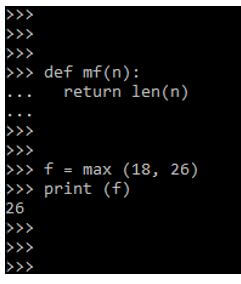
Example #3
The below example shows to import the specified module to execute the Python code faster.
Code:
from math import sqrt
val = sqrt(50)
print (val)Output:

Example #4
The example below shows the use list to execute the Python code faster. In the below example, we have defined a specified range.
Code:
ls = [i**2 for i in range(1, 90) if i%2==0]
print(ls)Output:

Example #5
The below example shows how we can concatenate the string in Python to execute our code fast as follows.
Code:
pf = "*".join(["AB", "PQ", "XY"])
print(pf)Output:

Conclusion
Python is not considered the fastest programming language as per the speed of execution. Regarding the speed of development, python is faster than other languages. It is considered in multiple ways, but in general, the Python programming language is not fast in execution compared to another language like C.
Recommended Articles
We hope that this EDUCBA information on “Python Fast” was beneficial to you. You can view EDUCBA’s recommended articles for more information.


